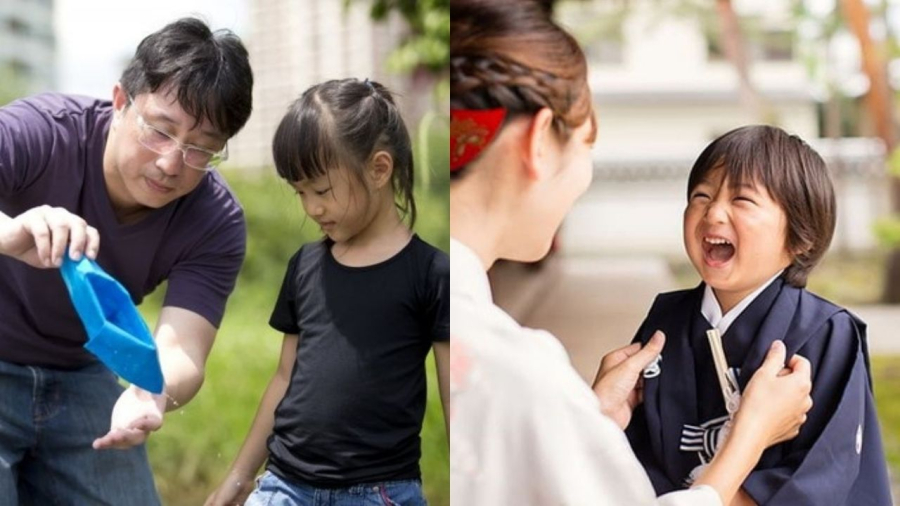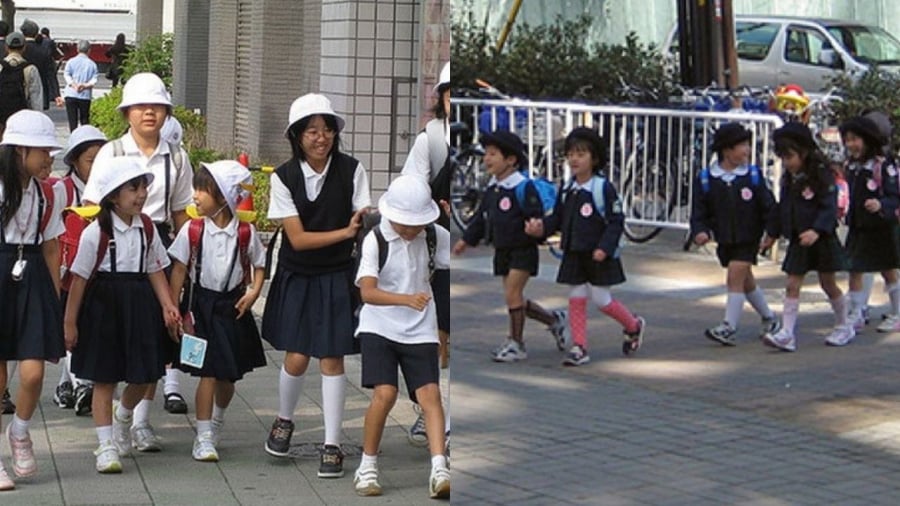Japanese parents have their own principles in raising children. Japanese children are very intelligent from a young age, which many Vietnamese parents admire. If you want to raise your child in the Japanese style, you can refer to their methods below.
Allow children to move a lot
Children have a lot of energy. Allowing children to move according to their needs helps them maximize their skills and energy. Japanese children often walk instead of taking a car. Parents also don’t carry their children too much to allow them to move. According to natural development, children love to move, especially when they are 2 years old. Therefore, let your child develop and move, don’t be afraid of them becoming tired. Japanese children from the age of 2 are often encouraged to walk to help physical and mental development. Exercise not only helps physical development but also helps brain development. Japanese children are even taught to walk on uneven paths or stairs. The purpose is to help children develop better skills.

Don’t talk about their children
Japanese people tend to keep their privacy and do not share information about their children except with close relatives. All they care about is which soccer team their child is playing for, which club they are participating in, and whether they are sociable. They never brag about their children to others. However, this does not mean that there is no pressure in terms of education and talent. Raising children in Japan is very competitive to get into top schools.
Emphasize fairy tales
Japanese parents focus on telling their children fairy tales because they believe that the world of mythology is a material and inspiration for children. Children grow up in an imaginary world, which makes them more emotional and creative.
Teach children how to concentrate
Concentration is an important factor for children’s development and learning. Lack of concentration makes it difficult for children to absorb new things, have poor memory, and have difficulty in being creative. Japanese parents teach their children to concentrate from an early age, starting with lessons on colors. Children are exposed to colors early on, starting with the colors black and white. As they grow older, they learn to distinguish colors. Colors help children focus and develop better visual acuity. Through lessons on colors, children also develop their brain.
2-year-olds focus on language
2-year-old children have a high demand for movement and communication. This is the best time for children to develop their language skills when they start speaking. Therefore, parents need to seize this time to develop their children’s language skills. Japanese parents often talk to their children during this stage. There are many ways for parents and children to play language games, such as asking the child about what is happening, creating questions for the child to think about language. When the child is 2 years old, parents should buy books with images and read the content aloud to the child, and the more enthusiastic the child, the more parents should read. 2-year-old children especially love stories with endings, so you should teach them about that to help them remember better. For example, if the child is afraid of getting burned when touching hot water, say “Don’t touch the hot water, you will get burned.” However, it is important to avoid thinking in terms of things that have made the child’s mother hurt, the table that made the child hurt, because that is not the true nature and it is not good for the child’s sense of responsibility.

Create difficult situations to learn how to share
There is a story about a woman named Hideko who usually only buys one ice cream for her two children. For this one ice cream, who holds it, who eats it first, and who gets a bigger bite are the things that the two children often argue about. Hideko usually remains silent and watches how the children handle it, only intervening when one of the children shows extreme behavior.
Of course, Hideko can buy two portions, even two completely identical portions of food, but she deliberately creates such situations to see how her children solve them. When people crave something that there is only one of, how will they solve it? Lying on the ground and throwing a tantrum, rolling over and over can solve the problem? Whether in society or at preschool, school, young children are respected and treated equally, and the opportunity to share is becoming less and less, so Hideko must be resourceful and create difficult situations for young children to learn how to share, compromise, and find their own solutions.
Praise specific behaviors of children
Japanese parents do not praise their children in a general way like “my child is very good, my child is too good.” Instead, they praise specific things like “you eat rice very well, you draw beautifully…” Because specific actions make children more aware of themselves to develop themselves.
Not allowing children to watch TV before the age of 3
Japanese parents are very strict about children watching TV or using mobile devices because audiovisual stimuli have a great impact on children. When children of this age are focusing on developing language skills, their brains are forming wrinkles, so not allowing children to watch TV is a basic principle that helps children develop better intelligence.
Express children’s thoughts
People often say that “2-year-olds are really hard to understand.” This is very normal.
At 2 years old, children begin the stage of independence, wanting to separate from their parents and do things on their own. Therefore, when adults say “no,” they will immediately resist. When they want to do something that is not allowed, they become angry. Sometimes, they stomp their feet, jump up, or roll on the floor as a way of expressing dissatisfaction.
When the child cries, try to put yourself in the child’s shoes and teach them how to express their opinions. If you only scold them with “Why are you crying,” it will be very difficult for both of you to overcome this stage. If they can express their thoughts and feelings in words, everything will be easier.
Allow competition for children to find their own abilities
Except for competing for food or toys, young children argue about all kinds of things, including sleeping with their mother. They can argue about these things and Japanese mothers often do not intervene, nor do they necessarily tell the older child to give way to the younger one. In the family, parents can intervene, but in society, there is not complete fairness. Therefore, it is necessary to let children find their own abilities, realize that they are small and obey social rules, and even accept some implicit rules. They have to overcome their own circumstances, the more they resist, the more they have to make an effort.
Be patient and repeat
Children often have many things that are incomprehensible, but Japanese parents are very patient in answering their children many times. They are not afraid to explain a problem to their children multiple times.
Encourage risk-taking and experimentation
Usually, intelligent children tend to like taking risks, and even if they are forbidden, they will hide from their parents and do what they want, experiments, and challenges can bring even greater development. Therefore, parents should not be too strict and afraid of protecting their children. Within the controllable range, parents should create conditions for children to experiment and encourage them to explore. Children getting hurt is not scary; what is scary is that they do not learn to deal with injuries, difficulties, and challenges.
2-year-olds have a photographic memory
Children develop rapidly in the 2-3-year-old stage, so parents need to understand this stage, which is the most important stage in the child’s development. What they learn at this stage will shape who they become in the future. The age of 2 is the best stage for a child’s memory. Therefore, when your child is 2 years old, you need to help them develop their memory as much as possible. For example, teach them about the flags of different countries, different types of cars, different types of flowers…
Not everything about Japanese people is the best, and each parent has their own perspective on raising their children. However, if you truly want your child to be intelligent…
Mothers’ Need for Awareness of Dual Activity of Breastfeeding and Watching TV
In the contemporary world, in which technology pervades our lives, some mothers tend to soothe their babies through nursing while simultaneously watching television. Although this practice may not appear to affect the infant, studies show that it can in fact have dire repercussions on the baby’s well-being, both in terms of physical health and mental growth. In this article, we will look at the possible reasons for this activity and its potential outcomes.



































